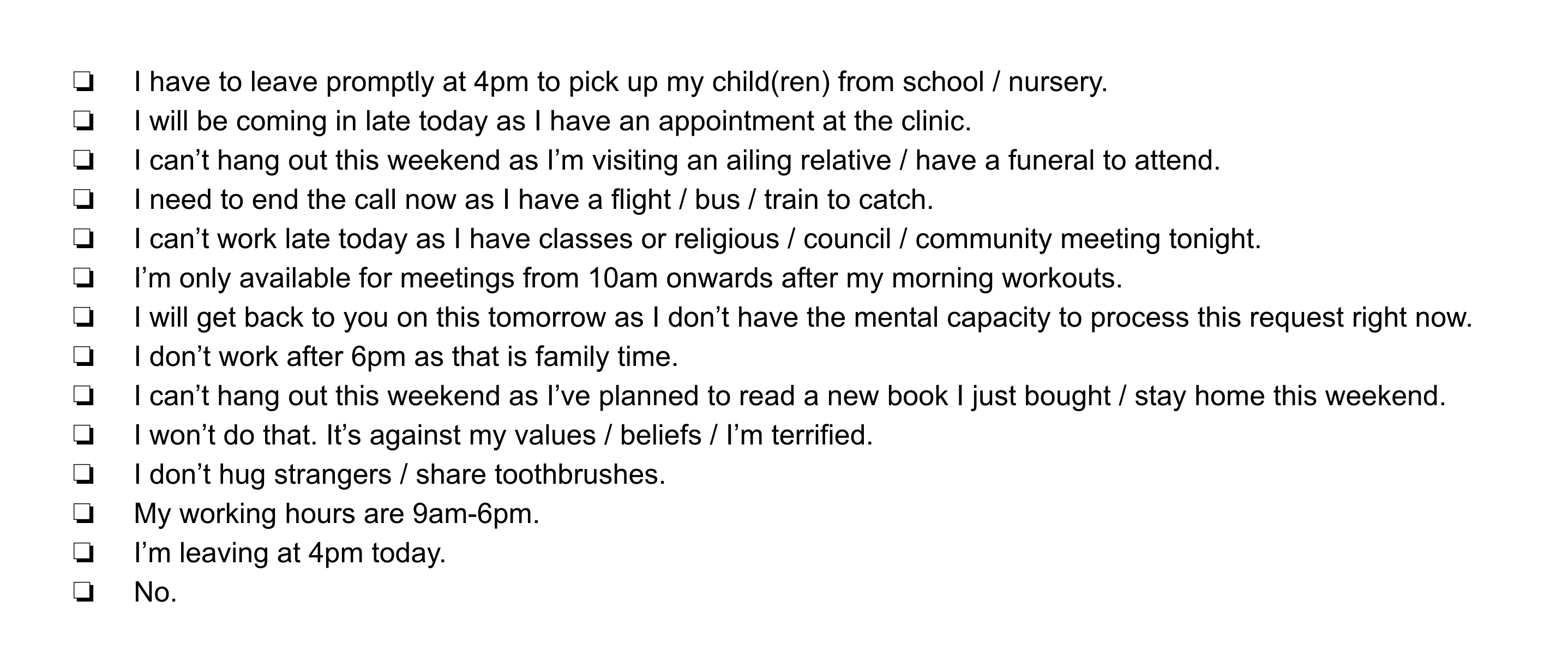
Personal boundaries are the limits and rules we set for ourselves within relationships to maintain balance and protect our bodies, minds, emotions and time from the behaviour or demands of others. That said, how successful are you at establishing your personal boundaries* with others? (*Some examples of boundary areas include material, physical, mental, emotional, sexual, spiritual, time, etc.)
How many of these sample sentences below would you find easy to tell your colleagues, friends and family? If there were some that were not quite as easy to verbalise, why did you find it so?

Why is it easier to make known our boundaries to others at certain times than some?
Firstly, as boundary-setting impacts the relationship we have with others, we have a natural inclination to put others’ needs and feelings before our own. Secondly, I believe that we weigh the level of complexity to state our boundaries simply to others by the two types of boundaries we have conditioned ourselves to view boundary-setting:
- Objective boundaries - It is easy to utter an objective boundary statement when the circumstance is an established societal comprehension and so well-accepted that it’s almost fact; to the point that it could backfire if you don’t have such a boundary. For example, not excusing yourself from a meeting in time to catch your flight / bus / train. If the attendees were aware of your schedule, they could even be the ones setting the boundaries for you by chasing you out the door.
- Subjective boundaries - It is more difficult to communicate a subjective boundary as it first relies on the comfort-level of the relationship at hand; in some instances it would be easier to convey the message with a stranger instead of a loved one and vice versa. The underlying reason for this is guilt and fear. Guilt because you feel that you don’t have the right to set up a boundary which leads you to feel like you're pushing someone away by putting up your fences. Fear because you believe that setting boundaries will jeopardize the relationship which could lead to severe consequences like losing a friendship, a career progression opportunity or job. For example, saying ‘no’ to someone you care about or disagreeing with a senior stakeholder at work.
So, how do you go about establishing subjective boundaries for the better?
If you found it hard to plant hedges around yourself for fear of disrespecting others, you could start by reapplying that respect towards yourself. Showing yourself respect will help you develop your identity. When you know your worth, you will be comfortable in flexing and articulating your boundaries according to your values as well as the requirements of the circumstance. This will influence others’ behaviour towards you. Hopefully, you may then begin to appreciate that establishing personal boundaries is a healthy pursuit, not just for yourself but also for others.
A key ingredient to successfully establish personal boundaries is effective communication; that is, the message that you’re conveying is accurately interpreted at the receiving end. When both parties are on the same page, you will find an increase in engagement and this leads to an enhanced relationship.
So, go on and establish healthy boundaries around yourself, it can only help your relationships to grow.
What have you done to communicate your boundaries effectively? Drop me a comment below.
Want to successfully establish healthy boundaries?
